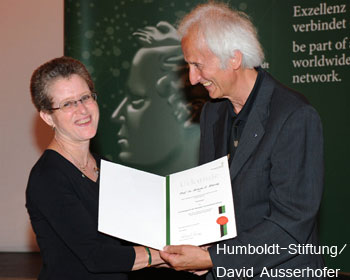Observation
Crossing Borders to Build a Better Robot

Roberta Klatzky accepts the Humboldt Research Award from Von Humboldt Foundation President Helmut Schwarz.
Roberta Klatzky has spent much of her career getting to know robots. Thanks to the Humboldt Research Award, Klatzky, who serves as APS Treasurer, got to experience a new aspect of robotics during her stay at the Institute of Automatic Control Engineering (LSR) at the Technical University of Munich in Germany.
Klatzky, a professor of psychology and human-computer interaction at Carnegie Mellon University, studies human perceptions and cognition with an emphasis on haptic perception and spatial cognition. She is interested in designing robots that can respond to humans in a way that is convincing and personal. Her work has implications for haptic interfaces, navigation aids for the blind, and exploratory robots.
“Having the opportunity to reside in an Institute dedicated to issues of robot control was really enlightening,” Klatzky says. “I can proudly claim that not only have I socialized with a robot by shaking its hand, but we’ve danced together! So far, you’d never mistake a robot for a human when dancing in a dark bar, but you’d be surprised how effective these interactions can be.”
While in Munich, Klatzky collaborated with Angelika Peer, Raphaela Groten, and Daniela Feth on a paper “that describes how two people can collaboratively steer an object by communicating their intentions through haptics.”
“It was a wonderful experience personally and professionally,” Klatzky says. “I’m very grateful to the von Humboldt Foundation for facilitating my visit.”
![]() Klatzky, R. L., Wu, B., & Stetten, G. (2008). Spatial Representations From Perception and Cognitive Mediation: The Case of Ultrasound. Current Directions in Psychological Science, 17 (6), 359-364 PMID: 20448831
Klatzky, R. L., Wu, B., & Stetten, G. (2008). Spatial Representations From Perception and Cognitive Mediation: The Case of Ultrasound. Current Directions in Psychological Science, 17 (6), 359-364 PMID: 20448831





APS regularly opens certain online articles for discussion on our website. Effective February 2021, you must be a logged-in APS member to post comments. By posting a comment, you agree to our Community Guidelines and the display of your profile information, including your name and affiliation. Any opinions, findings, conclusions, or recommendations present in article comments are those of the writers and do not necessarily reflect the views of APS or the article’s author. For more information, please see our Community Guidelines.
Please login with your APS account to comment.